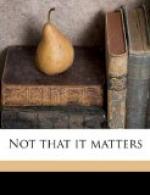Nothing is easier than to assume that other people share one’s weaknesses. No doubt Jack the Ripper excused himself on the ground that it was human nature; possibly, indeed, he wrote an essay like this, in which he speculated mildly as to the reasons which made stabbing so attractive to us all. So I realize that I may be doing you an injustice in suggesting that you who read may also have your little snobberies. But I confess that I should like to cross-examine you. If in conversation with you, on the subject (let us say) of heredity, a subject to which you had devoted a good deal of study, I took it for granted that you had read Ommany’s Approximations, would you make it quite clear to me that you had not read it? Or would you let me carry on the discussion on the assumption that you knew it well; would you, even, in answer to a direct question, say shamefacedly that though you had not—er—actually read it, you—er—knew about it, of course, and had—er—read extracts from it? Somehow I think that I could lead you on to this; perhaps even make you say that you had actually ordered it from your library, before I told you the horrid truth that Ommany’s Approximations was an invention of my own.
It is absurd that we (I say “we,” for I include you now) should behave like this, for there is no book over which we need be ashamed, either to have read it or not to have read it. Let us, therefore, be frank. In order to remove the unfortunate impression of myself which I have given you, I will confess that I have only read three of Scott’s novels, and begun, but never finished, two of Henry James’. I will also confess —and here I am by way of restoring that unfortunate impression—that I do quite well in Scottish and Jacobean circles on those five books. For, if a question arises as to which is Scott’s masterpiece, it is easy for me to suggest one of my three, with the air of one who has chosen it, not over two others, but over twenty. Perhaps one of my three is the acknowledged masterpiece; I do not know. If it is, then, of course, all is well. But if it is not, then I must appear rather a clever fellow for having rejected the obvious. With regard to Henry James, my position is not quite so secure; but at least I have good reason for feeling that the two novels which I was unable to finish cannot be his best, and with a little tact I can appear to be defending this opinion hotly against some imaginary authority who has declared in favour of them. One might have read the collected works of both authors, yet make less of an impression.




